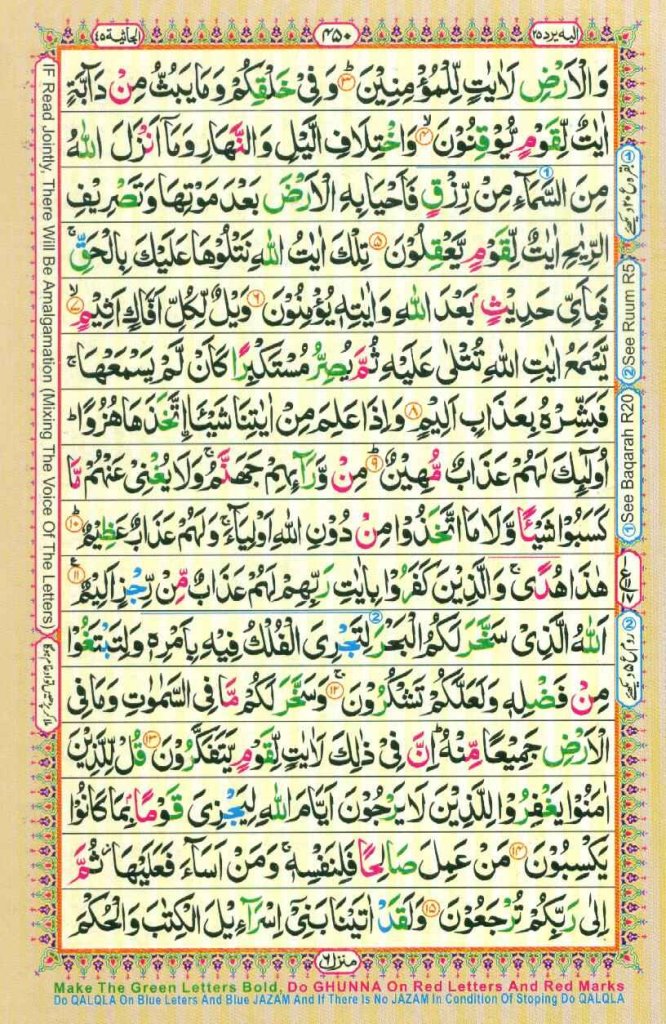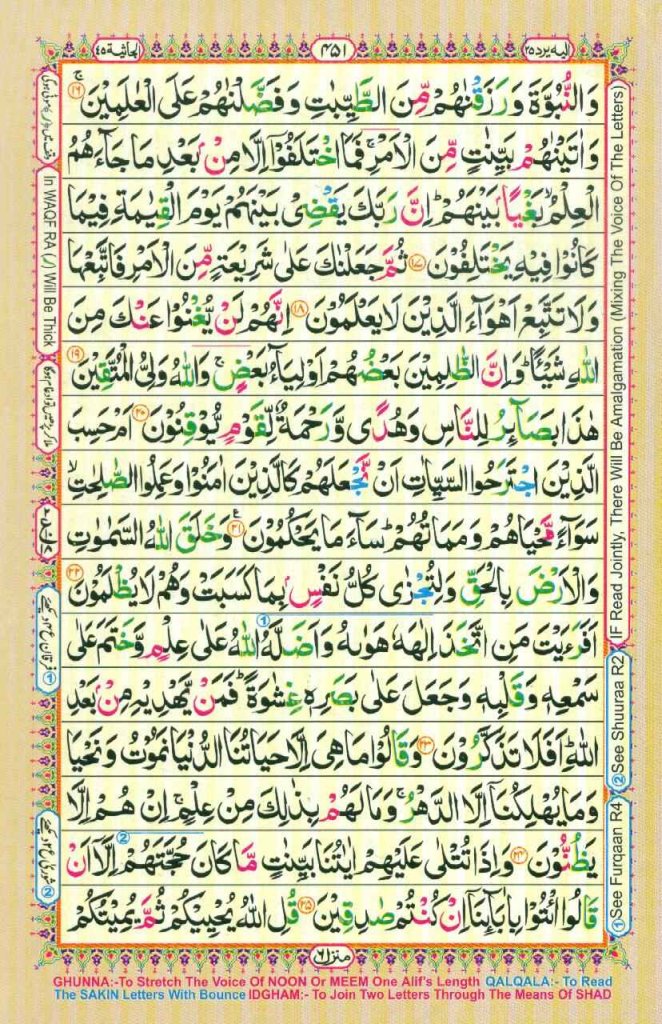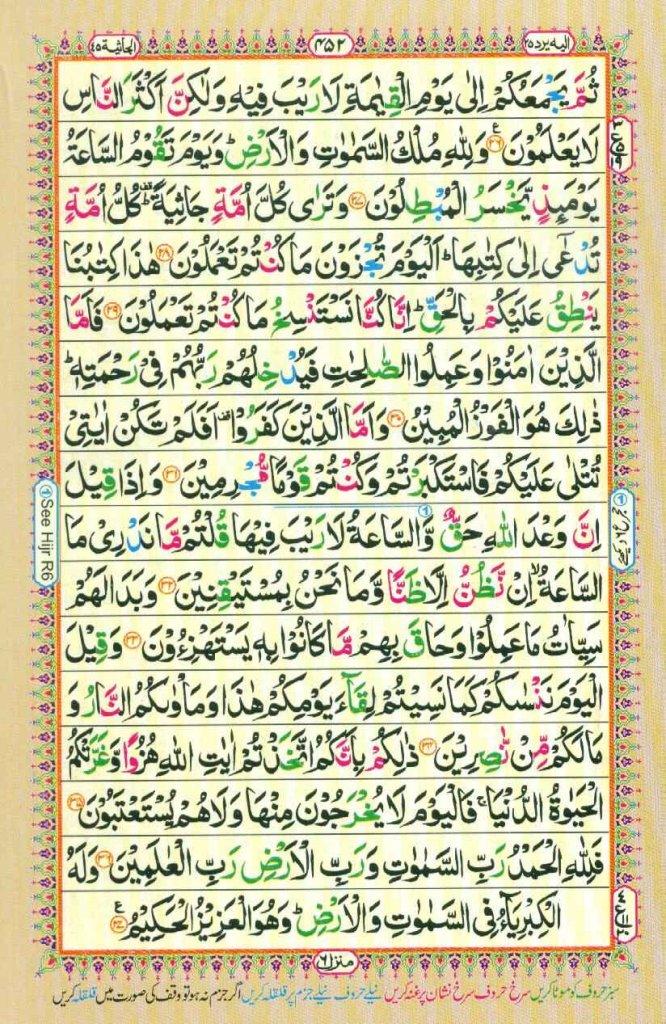Free Download Surah Al Jasia
Surah jasia read online full text
Al-Jathiyah (Arabic: الجاثية) is the 45th chapter of the Quran. It consists of 4 Rukus, 37 verses, 488 words, and 2014 letters. The surah is named after the Arabic word “Al-Jathiyah,” which means “The Kneeling” or “The Crouching.” Al Jasia is a Meccan surah, and this is one of the seven chapters in the Qur’an that begin with the Muqatta’at letters Hāʼ Mīm. It includes discussions on the “signs of God” for humanity to ponder. Moreover,it describes the consequences for those who reject God despite these signs. Additionally, it contains the only Quranic verse that mentions sharia, a term later used by Muslims to refer to Islamic law.
Read colour coded Surah al Jasia in Arabic with tajweed rules at Islamicsurah.com.




Surah Jathiyah summary
- If the disbelievers do not accept Allah and His revelations, then what message will they believe in?
- Surah al Jathiyah ayat 9 describes the attitude of those who hear the revelations of Allah but mock or disregard them arrogantly. It warns them of a severe punishment due to their rejection and arrogance towards Allah’s guidance.
- Surah Al Jathiyah ayat 12 describes that Allah has made the seas and everything between the heavens and the earth subservient to human beings.
- The Israelites formed sects in their religion after receiving knowledge through the Torah.
- Allah is the guardian of the righteous.
- Whoever idolizes their own desires, Allah will lead them astray and place a seal on their ears and heart.
Surah Jasia benefits
Following are the virtues and Surah al Jasia benefits:
- Hazrat Ibn Mas’ud (RA) said, “The Ha-Meems are the beautifications of the Quran.”
- Khaleel ibn Murrah narrated that the Messenger of Allah (blessings and peace of Allah be upon him) said, “The chapters starting with Ha-Meem are seven, and there are seven gates of Hell. Each chapter starting with Ha-Meem will come and stand at one of these gates, saying, ‘O Allah, do not allow anyone who believed in me and recited me to enter through this gate.'”
- Hazrat Ibn `Abbas, (RA), said, “Everything has its essence, and for the Qur’an, it’s the Ha Mim family.”
- Samrah bin Jundub narrated, “Surahs starting with Ha-Meem are like gardens from the gardens of Paradise.”
- Ishaqq bin Abdullah narrated, “Every tree has its fruit, and the fruit of the Quran are the Surahs starting with Ha-Meem. Whoever wishes to be in the lush gardens of Paradise should recite these Surahs.”
- The Prophet Muhammad (PBUH) said, “Whoever recites Surah Ha-Mim Al-Jathiyah, Allah will conceal his faults and grant him peace, while others’ knees will be trembling during the reckoning. It is also narrated that whoever recites this Surah will not be afraid on the Day of Judgment, and his private parts will remain covered, whereas all others will be raised naked on that day.”
Mention of Sharia (Islamic Law)
This verse is notable for being one of the few in the Quran that explicitly mentions the term “sharia,” which refers to Islamic law and principles governing Muslims’ lives.
ثُمَّ جَعَلْنٰكَ عَلٰى شَرِیْعَةٍ مِّنَ الْاَمْرِ فَاتَّبِعْهَا وَ لَا تَتَّبِـعْ اَهْوَآءَ الَّذِیْنَ لَا یَعْلَمُوْنَ(18)
Then We put you on the right path concerning this matter, so follow it, and do not follow the desires of those who do not know.
In Surah Al Jathiyah ayat 18, Allah directs believers to follow the exemplary path set forth by Him. It urges them to adhere steadfastly to His guidance. This command serves as a clear directive to avoid aligning oneself with the heedless desires of those who choose to deviate from Allah’s ordained path. It underscores the importance of obedience to divine law. it also emphasizes the pitfalls of indulging in baseless whims and fleeting desires. By adhering to the Sharia, Muslims are guided towards righteousness and protected from the distractions that lead others astray. It encourages believers to prioritize Allah’s commandments above all else, ensuring steadfastness on the path of faith and obedience.
The Consequences of Idolizing Desires
Surah al Jathiyah ayat 23, presents a profound reflection on the consequences of prioritizing personal desires over divine guidance. It vividly illustrates the fate of those who make their own whims their deity, turning away from Allah’s guidance despite being endowed with knowledge.
اَفَرَءَیْتَ مَنِ اتَّخَذَ اِلٰهَهٗ هَوٰىهُ وَ اَضَلَّهُ اللّٰهُ عَلٰى عِلْمٍ وَّ خَتَمَ عَلٰى سَمْعِهٖ وَ قَلْبِهٖ وَ جَعَلَ عَلٰى بَصَرِهٖ غِشٰوَةًؕ-فَمَنْ یَّهْدِیْهِ مِنْۢ بَعْدِ اللّٰهِؕ-اَفَلَا تَذَكَّرُوْنَ(23)
The verse begins by inviting contemplation:
“Have you seen the one who has taken his desires as his god?” This rhetorical question immediately prompts introspection among readers. It urges them to consider whether they too are placing their desires above Allah’s commandments.
Allah then describes the outcome of such a misguided choice:
He allows the individual to wander astray, veiling their understanding and perception. “And Allah sends him astray knowingly and seals his hearing and his heart and sets a cover upon his sight.” This imagery portrays a spiritual blindness that results from willfully turning away from the truth.
The verse concludes with a poignant question:
“Then who will guide him after Allah?” This question challenges the reader to recognize the ultimate futility of seeking guidance elsewhere once Allah has withdrawn His guidance due to persistent defiance and disobedience.
FAQ’s
Surat Jasia is located 25th para (juz) of the Quran.
Surah Al-Jathiyah, is named after the Arabic word “Al-Jathiyah,” which means “The Kneeling” or “The Crouching.” The chapter discusses various aspects of faith, guidance, and accountability. It also emphasizes reflections on the signs of Allah and warning against disbelief and its consequences.
Surah Jasia full reminds people to ponder the signs of Allah and warns of punishment for those who reject these signs. It introduces the concept of sharia, Islamic law that guides believers.
Recitation of ayat 36-37 of Surah Jasia 3 times in the morning and evening is beneficial for providing sustenance.